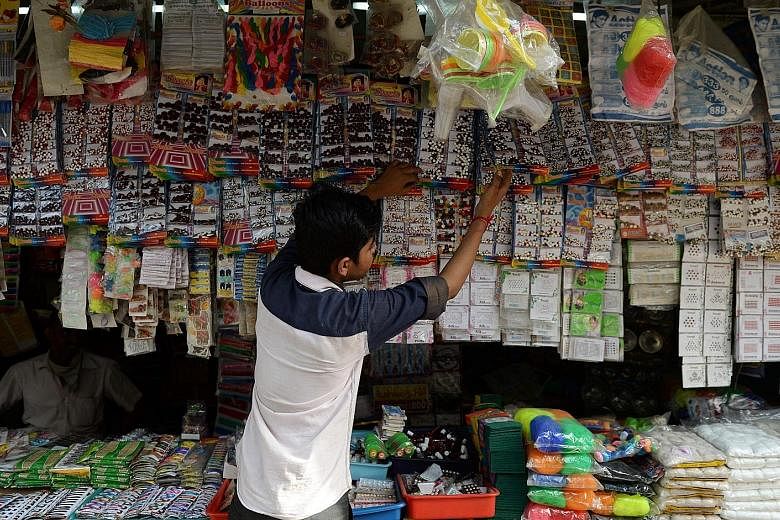India's goods and services tax (GST) starts today - the biggest tax reform since its independence from colonial rule, but many businesses feel the implementation has been rushed and, for some, the new system seems overly complex.
For Prime Minister Narendra Modi, the tax is a major success. He has championed wide-ranging reforms such as land use and cutting red tape to streamline investment and modernise India's economy. But passing the GST has been a hard grind and politically divisive.
The opposition Congress Party - which proposed the tax over a decade ago while in power but failed to get political consensus - said yesterday it would boycott a gala launch event at the federal Parliament at midnight (2.30am today Singapore time). Former premier Manmohan Singh was among those who said they would not attend.
The party says there should be a two-month trial run before a formal rollout, and that over 30 per cent of the revenue base has been kept out of the GST Bill, including petroleum, electricity, coal and real estate.
The government, however, says the tax will increase revenue collection, cut corruption and boost the country's sovereign credit profile.
It will also do away with a complex system of state and federal taxes on goods shipped from one state to the next.
Businesses have been rushing to train staff and get office systems in place. The government, in view of expected teething issues, has given a two-month reprieve before tax returns need to be filed online.
Yesterday, hundreds of traders held protests in various parts of the country. They ranged from traders seeking exemptions or a lower tax for specific products to those worried about digitisation.
-
How the tax works
-
The goods and services tax will convert India into a unified market, well almost.
The tax will reduce almost a dozen taxes at the federal and state level, such as sales excise and customs, to three taxes - a state GST, a federal GST and an integrated GST. The federal and state government will share the GST on goods and services, but if goods cross state borders then they will attract integrated GST, collected by the federal government.
The integrated GST will also apply to imports.
Unlike Singapore, there are four tax bands from 5 per cent, 12 per cent, 18 per cent and 28 per cent on goods as part of a compromise formula agreed between the federal government, 29 states and seven union territories. Alcohol and petroleum products, the biggest earners for state governments, are exempted for now.
So a person sending goods now pays one tax based on which bracket the item falls under. This is a change from when goods attracted multiple taxes at different levels, at times at the tax authorities' discretion.
At state borders, trucks used to park at roadsides in long queues as drivers paid entry tax under the old system. Now, these delays will be done away with because the entire system has gone online. Taxes can be paid and returns all filed online. A taxpayer will have to file three returns monthly and one annual return.
The new system is expected to increase tax compliance. As businesses need a tax number to claim credit on the cost of inputs, unregistered businesses will find it harder to transact with those already in the system. The tax department is increasing its staff from 46,000 to 80,000 by March next year, said The Times of India.
Nirmala Ganapathy
Mr Jeevan Ghai, 57, is among millions of small traders who do not quite know what to do now that the new tax is in place.
"I don't own a computer and don't know how to use one. I am a little scared of this new system. I went for workshops. But I still don't understand it fully," he said at Delhi's Kashmere Gate. The area is filled with hundreds of small shops.
He has registered himself as a taxpayer under the GST, but has not yet made arrangements to file taxes or returns.
"Many companies are not ready. It will take time for people to get off the learning curve," said managing director Rishi Sahai of investment bank Cogence Advisors.
To help the nation prepare and boost awareness, the government has launched a massive media campaign, with telephone helplines to address public concerns. So far, more than three-quarters of the 8.1 million companies registered with federal and state tax departments have enrolled with the GST Network, reported Reuters.
Massive IT back-end resources will be needed to process the expected volumes of up to three billion invoices a month.
Some firms say they are ready.
"We started preparations a few months ago, though the rules were still coming and in place only in the past few days," said Mr Rajeev Jain of Intex Technologies. "If India is successful, its reputation as a tax-compliant country will go up sharply."
Simplification of the tax system could add 2 percentage points to economic growth, according to government estimates.
It is also expected to improve investor confidence. Mr Modi, during his recent visit to the United States, highlighted the GST as one instance of his government's determination to make doing business easier.
The impact on the economy is expected to be long term, said experts.
"The government has also introduced an anti-profiteering mechanism to curb inflation. After the initial teething period, the complexities associated with the GST are likely to reduce substantially. In the long term, it will be a Good and Simple Tax and a significant contributor to the GDP," said Mr Harsh Shah,a partner at Economic Laws Practice.

